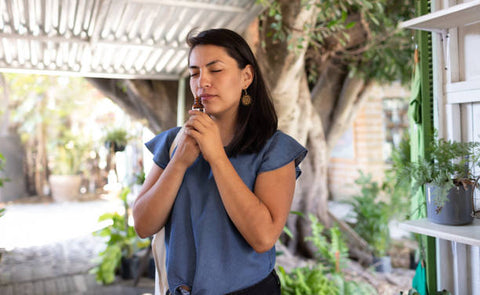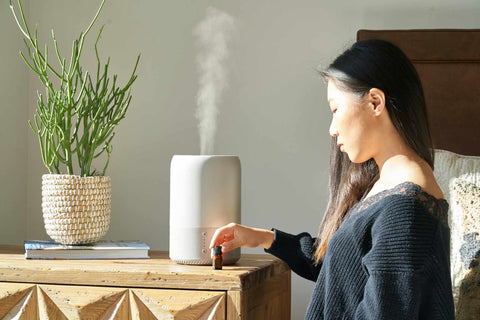6 min read / 4 March 2024 / yasmin sharp
How to Use Essential Oils to Boost the Immune System
Discover natural ways to enhance your immune system using essential oils with proven health benefits.

Can you boost the immune system with essential oils?
The best essential oils to boost the immune system
How can you use essential oils to boost the immune system?
Our immune system plays a pivotal role in maintaining good health and as resourceful as our bodies are when it comes to warding off bacteria and germs, sometimes it needs a little helping hand.
Some people attempt to boost the immune system with essential oils, as they contain a host of natural properties that could be used to improve our wellness.
This includes anti-inflammatory, antibacterial and antimicrobial compounds that research has found to offer a positive contribution to our immune systems.
In this article, we discuss which essential oils can support your immune system and how to use them effectively.
What is the immune system?The immune system is a complex system of tissues, proteins cells and organs that all work in conjunction to keep your body protected against a variety of invaders. These include toxins, viruses, bacteria and fungi. There are two main parts of your immune system:
Both parts of your immune system work in tandem to keep your body healthy, although when they are compromised or weak, your body may struggle to fight off illnesses or infections. If this happens, it can take longer to recover from certain types of illnesses and have a greater negative impact on your health. |
Can you boost the immune system with essential oils?
It is believed that the natural properties contained in many essential oils could prove helpful in boosting the immune system.
Whilst some of the evidence produced to date is anecdotal, there is a growing base of scientific research that reveals certain essential oils have demonstrated immune-boosting potential.
One of the most common ways that essential oils have been shown to boost the immune system is by reducing stress.
When people become severely stressed, it can cause a level of immunosuppression that affects the functionality of the immune system, lessening the body’s ability to deal with illness.
By diffusing or inhaling essential oils, this can help to lower stress levels and ensure that the immune system can work as efficiently as possible.
There are some essential oils that can work as an immune stimulant. This means that in addition to supporting the immune system, they may also be able to provide an actively stimulant immune response.
The excretion of enzymes and hormones can be stimulated through the use of certain essential oils or they could encourage activity in specific areas of the immune system.
One study published in 2019 even suggested that the immune response could be balanced with essential oils, helping to prevent the body from experiencing unnecessary stress. [1]
Antiseptic and antimicrobial essential oils can offer some support if the immune system is weaker and unable to repair the body as quickly as normal.

What are the best essential oils to boost the immune system?
If you want to boost the immune system with essential oils, you could try some of the following:
1. Eucalyptus oil can help to boost immunity
Many people use eucalyptus oil to treat respiratory and cough infections. When testing the oil in laboratory-grown innate immune cells, researchers found that eucalyptus oil enhanced phagocytosis (when immune cells ‘eat’ a germ), whilst also reducing inflammatory cytokines levels. [2]
A later study, published in 2017, also published similar results to strengthen these findings. [3]
2. Clove oil may lower inflammation and protect the body
Clove essential oil was used as part of a series of tests involving laboratory-grown macrophages (white blood cells that kill microorganisms). [4]
Researchers learned certain dosages of the oil allowed it to reduce some inflammatory cytokines.
In a 2021 mouse study, researchers found that compared to a group of mice given a placebo, those who were given clove oil experienced less inflammation, lower levels of bacteria in their intestines and fewer signs of cell death in their large intestine. [5]
3. Lavender oil can work as a great stressbuster
Lavender is one of the most popular types of essential oil and is widely known for its ability to lower stress levels and work a mild sedative.
Researchers used the oil in a study involving 52 pregnant women, finding that when it was massaged regularly into the body, there was a higher level of IgA, which is an immune function marker. [6]
Lavender oil was also assessed in a mouse model study in 2018, revealing that low doses were able to reduce inflammation levels. [7]
4. Tea tree oil could be used as an anti-inflammatory and antimicrobial agent
Another way you could try to boost the immune system with essential oils is with tea tree.
Historically tea tree oil has been used to treat respiratory illnesses and skin conditions and researchers also found that the production of inflammatory cytokines could be affected by a concentrated tea tree oil solution. [8]
5. Oregano oil can offer the body antifungal and antibacterial protection
With its anti-parasite, antibacterial, antifungal and antiviral properties, oregano oil could become a secret weapon for boosting your immune system.
Studies have found that the thymol and carvacrol compounds contained in oregano are responsible for its antimicrobial activity. [9]
Researchers have also published results that demonstrate the oil’s antibacterial activity against bacteria like S. saprophyticus and B. laterosporus. [10]

How can you use essential oils to boost the immune system?
There are a few ways you can boost the immune system with essential oils:
- Diffusion: A popular way to engage with the natural properties provided by essential oils is through diffusion. This allows you to carry on with your day as the oil slowly burns and releases into the air.
- Homemade spray: Another option could be to make a homemade cleaning spray to naturally boost the immune system. Oils with antiseptic and antibacterial properties can be used on surfaces to keep unwanted germs and bacteria at bay.
- Topically: Simply dilute your chosen essential oil with a carrier oil (one teaspoon of carrier with 2-3 drops of essential oil) and rub it into the chest to naturally inhale. First-time users of an oil should always complete a patch test to check its suitability to your skin.
- Inhalation: This is similar to diffusion in some respects, although you have more flexibility. It involves simply inhaling directly from the essential oil bottle or adding a few drops to a handkerchief of tissue to inhale. It also means you can take your oil with you wherever you go.
- Candles and soaps: Many people make scent-infused soaps and candles using essential oils. This offers a great way to incorporate the natural benefits of the oils into your daily routine without having to make any significant changes.
When using any essential oil topically, you should always dilute it with a carrier oil, as they are highly concentrated in their pure form and can cause irritation.

We need to keep our immune system as strong as possible, and research suggests that you may be able to boost the immune system with essential oils in a variety of ways.
Whether it's reducing stress, preventing infection or stimulating immune response, these oils can give the body extra support when it needs a little boost.
And you can easily incorporate them into your daily routine through diffusion, topical application, homemade sprays or even fragrance-infused soaps and candles.
[1] Agnes Peterfalvi et al. (2019) Much More Than a Pleasant Scent: A Review on Essential Oils Supporting the Immune System https://www.ncbi.nlm.nih.gov/pmc/articles/PMC6943609/
[2] Annalucia Serafino et al. (2008) Stimulatory effect of Eucalyptus essential oil on innate cell-mediated immune response https://www.ncbi.nlm.nih.gov/pmc/articles/PMC2374764/
[3] Niket Yadav et al. (2017) Suppression of inflammatory and infection responses in lung macrophages by eucalyptus oil and its constituent 1,8-cineole: Role of pattern recognition receptors TREM-1 and NLRP3, the MAP kinase regulator MKP-1, and NFκB https://www.ncbi.nlm.nih.gov/pmc/articles/PMC5687727/
[4] Shaghayegh Pishkhan Dibazar et al. (2015) Immunomodulatory effects of clove (Syzygium aromaticum) constituents on macrophages: in vitro evaluations of aqueous and ethanolic components https://pubmed.ncbi.nlm.nih.gov/24873744/
[5] Stefan Bereswill et al. (2021) Peroral Clove Essential Oil Treatment Ameliorates Acute Campylobacteriosis—Results from a Preclinical Murine Intervention Study https://www.ncbi.nlm.nih.gov/pmc/articles/PMC8066448/
[6] Pao-Ju Chen et al. (2017) Effects of Aromatherapy Massage on Pregnant Women's Stress and Immune Function: A Longitudinal, Prospective, Randomized Controlled Trial https://pubmed.ncbi.nlm.nih.gov/28783372/
[7] Gabriel Fernando Esteves Cardia et al. (2018) Effect of Lavender (Lavandula angustifolia) Essential Oil on Acute Inflammatory Response https://www.ncbi.nlm.nih.gov/pmc/articles/PMC5878871/
[8] Pauline Low et al. (2015) Immunomodulatory activity of Melaleuca alternifolia concentrate (MAC): inhibition of LPS-induced NF-κB activation and cytokine production in myeloid cell lines https://pubmed.ncbi.nlm.nih.gov/25858876/
[9] I Rodriguez-Garcia et al. (2016) Oregano Essential Oil as an Antimicrobial and Antioxidant Additive in Food Products https://pubmed.ncbi.nlm.nih.gov/25763467/
[10] Sabahat Saeed et al. (2009) Antibacterial activity of oregano (Origanum vulgare Linn.) against gram positive bacteria https://pubmed.ncbi.nlm.nih.gov/19783523/









